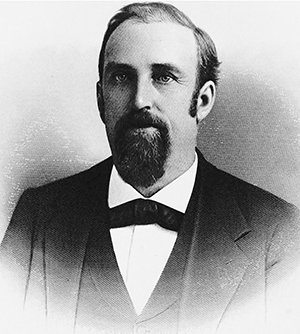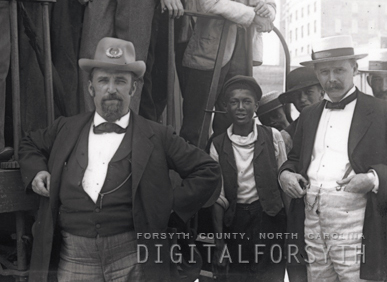Watson, Cyrus Barksdale
14 Jan. 1845–12 Nov. 1916
 Cyrus Barksdale Watson, legislator, attorney, and politician, was born in that part of Stokes County, near Kernersville, that is now in Forsyth County. He was the son of John W. and Maria Folger Watson. His paternal grandfather was Drewry Watson, a native of Scotland who settled in Prince Edward County, Va., in 1740 and married a Barksdale of Halifax County, Va., for whom his grandson was named. Watson's formal education began when he entered the school at Kernersville at age fifteen, but he soon left to join the Confederate army.
Cyrus Barksdale Watson, legislator, attorney, and politician, was born in that part of Stokes County, near Kernersville, that is now in Forsyth County. He was the son of John W. and Maria Folger Watson. His paternal grandfather was Drewry Watson, a native of Scotland who settled in Prince Edward County, Va., in 1740 and married a Barksdale of Halifax County, Va., for whom his grandson was named. Watson's formal education began when he entered the school at Kernersville at age fifteen, but he soon left to join the Confederate army.
In the spring of 1863 he enlisted as a private in Company K, Forty-fifth North Carolina Regiment, at Camp Mangum near Raleigh. This unit saw action in the Army of Northern Virginia, Ewell's Corps, Rhodes's Division. Watson, whose highest rank was second sergeant, was wounded three times; on the third occasion, at Spottsylvania in May 1864, his shoulder was shattered. Though not expected to live, he recuperated at home and returned to action before the end of the year. The wound reopened, however, and he went home. In March 1865 Watson again joined his regiment, this time near Richmond, unable to bear a gun. His unit was then ordered west to Appomattox. His shoulder wound continued to trouble him for the rest of his life.
After the war Watson was employed in farming and as a store clerk, first in Kernersville and later in High Point. In 1866 he began to study law in Lexington under James Madison Leach, who had served in both the U.S. and Confederate Congresses. Admitted to the bar in 1869, he entered the legal profession in Winston, then a village of between four and five hundred people. His lifelong practice there was interrupted only by his service in the General Assembly.
On 14 Nov. 1869 Watson married A. E. Henley, the daughter of W. F. Henley. They had five children: Mary, Alice, Fred, Netta, and Thomas.
In 1868 Watson was elected as a Democrat to the state senate and served two terms. A fluent debater, he was a practical and hardworking senator. In 1892 he was elected to the lower house of the General Assembly and served a single term. Among his committee assignments in the legislature were those on internal improvements, the judiciary, the code, and redistricting.
 In 1896 Watson was nominated by his party for governor. The election came during the period of Republican-Populist fusion when three parties ran gubernatorial candidates. Republican Daniel L. Russell won a plurality, and Watson became the first Democrat to suffer defeat since Reconstruction. In 1898 the Democrats regained control of both houses in the General Assembly. The next year Watson was one of the attorneys in the impeachment trial of Republican Chief Justice David M. Furches and Associate Justice Robert M. Douglas. In 1903 he was an unsuccessful candidate for the Democratic nomination to the U.S. Senate and thereafter continued to practice law in Winston.
In 1896 Watson was nominated by his party for governor. The election came during the period of Republican-Populist fusion when three parties ran gubernatorial candidates. Republican Daniel L. Russell won a plurality, and Watson became the first Democrat to suffer defeat since Reconstruction. In 1898 the Democrats regained control of both houses in the General Assembly. The next year Watson was one of the attorneys in the impeachment trial of Republican Chief Justice David M. Furches and Associate Justice Robert M. Douglas. In 1903 he was an unsuccessful candidate for the Democratic nomination to the U.S. Senate and thereafter continued to practice law in Winston.
Watson was a member of the Methodist church, the Norfleet Camp of Confederate Veterans, and the Winston-Salem Bar Association. He died after a long illness and was buried in the Salem Cemetery, Winston-Salem.
References:
Samuel A. Ashe, ed., Biographical History of North Carolina, vol. 4 (1906 [portrait]).
Walter Clark, ed., Histories of the Several Regiments and Battalions from North Carolina in the Great War, vol. 3 (1901).
Robert F. Durden, Reconstruction Bonds and Twentieth-Century Politics (1962).
Daniel H. Hill, Jr., ed., Confederate Military History, vol. 4 (1899).
Weymouth T. Jordan, comp., North Carolina Troops, 1861–1865: A Roster, vol. 11 (1987).
North Carolina Biography, vol. 4 (1928).
Raleigh News and Observer, 26–27 June 1896, 12, 19 Nov. 1916 [portrait].
Donald W. Stanley, comp., Forsyth County, North Carolina, Cemetery Records, vol. 4 (1976).
John S. Thomlinson, North Carolina Assembly Sketch Book (1883).
Additional Resources:
"Cyres [sic] Watson is Dead: Grand Old Veteran Died Saturday. Full of Years and Honors." The Dispatch [Lexington, N.C.]. November 15, 1916. 7. http://news.google.com/newspapers?id=5XQbAAAAIBAJ&sjid=AlEEAAAAIBAJ&pg=4752%2C6846721 (accessed May 20, 2013).
Manly, Clement. "Memorial of C.B. Watson." Proceedings of the Nineteenth Annual Session of the North Carolina Bar Association. Wilmington, N.C.: Wilmington Printing Co. 1917. 120-126. http://books.google.com/books?id=D1YZAAAAYAAJ&pg=PA120#v=onepage&q&f=false (accessed May 20, 2013).
"Cyrus B. Watson for Judge Clark: distinguished Democrat warmly endorses him for United States Senate." [C.B. Watson, Walter Clark]. [Raleigh? N.C. : s.n., 1912?]. http://digital.lib.ecu.edu/12927.1 (accessed May 20, 2013).
"Oil Portrait, Accession #: H.1964.123.71." . North Carolina Museum of History.
Image Credits:
E. G. Williams and Bro. "C.B. Watson." Biographical history of North Carolina from colonial times to the present volume 4. Greensboro, N.C.: C. L. Van Noppen. 1906. https://archive.org/stream/cu31924092215460#page/n621/mode/2up (accessed May 20, 2013).
Clark, Walter. Histories of the several regiments and battalions from North Carolina, in the great war 1861-'65. Raleigh, E.M. Uzzell, printer. 1901. https://archive.org/details/historiesofsever03clar (accessed May 21, 2013).
"Hon. C.B. Watson & Hon. Clement Manley." Old Salem Museums and Gardens. DigitalForsyth. http://www.digitalforsyth.org/photos/9578 (accessed May 20, 2013).
1 January 1996 | Johnson, Thomas H., Jr.